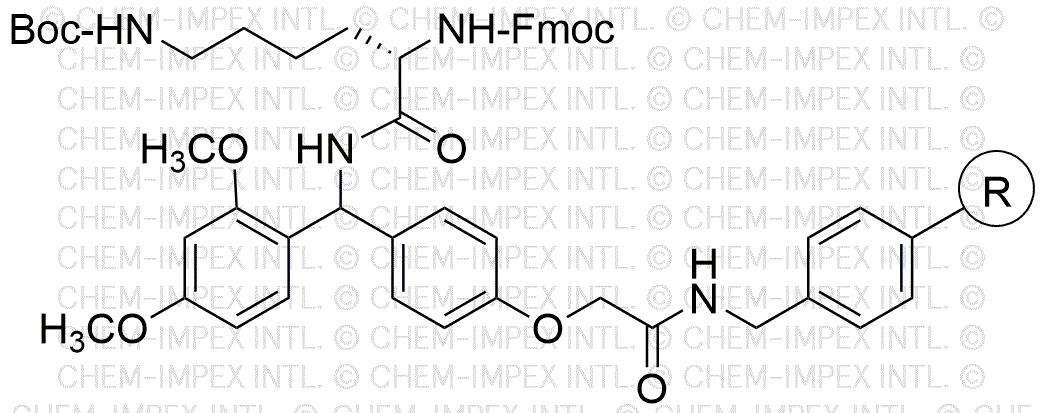Fmoc-L-Lys(Boc)-Rink amide AM resin is widely utilized in research focused on:
- Peptide Synthesis: This resin serves as a solid support for the synthesis of peptides, allowing researchers to create complex sequences efficiently through solid-phase peptide synthesis (SPPS).
- Drug Development: In pharmaceutical research, it is used to develop peptide-based drugs, which can target specific biological pathways, enhancing therapeutic efficacy.
- Bioconjugation: The resin facilitates the attachment of peptides to other biomolecules, aiding in the creation of targeted drug delivery systems and diagnostics.
- Research in Molecular Biology: It is employed in the study of protein interactions and functions, helping scientists understand cellular mechanisms and disease processes.
- Custom Peptide Libraries: This resin is ideal for generating diverse peptide libraries, enabling high-throughput screening for potential drug candidates or research tools.
General Information
Properties
Safety and Regulations
Applications
Fmoc-L-Lys(Boc)-Rink amide AM resin is widely utilized in research focused on:
- Peptide Synthesis: This resin serves as a solid support for the synthesis of peptides, allowing researchers to create complex sequences efficiently through solid-phase peptide synthesis (SPPS).
- Drug Development: In pharmaceutical research, it is used to develop peptide-based drugs, which can target specific biological pathways, enhancing therapeutic efficacy.
- Bioconjugation: The resin facilitates the attachment of peptides to other biomolecules, aiding in the creation of targeted drug delivery systems and diagnostics.
- Research in Molecular Biology: It is employed in the study of protein interactions and functions, helping scientists understand cellular mechanisms and disease processes.
- Custom Peptide Libraries: This resin is ideal for generating diverse peptide libraries, enabling high-throughput screening for potential drug candidates or research tools.
Documents
Safety Data Sheets (SDS)
The SDS provides comprehensive safety information on handling, storage, and disposal of the product.
Product Specification (PS)
The PS provides a comprehensive breakdown of the product’s properties, including chemical composition, physical state, purity, and storage requirements. It also details acceptable quality ranges and the product's intended applications.
Certificates of Analysis (COA)
Search for Certificates of Analysis (COA) by entering the products Lot Number. Lot and Batch Numbers can be found on a product’s label following the words ‘Lot’ or ‘Batch’.
Numéro de catalogue
Numéro de lot/série
Certificates Of Origin (COO)
This COO confirms the country where the product was manufactured, and also details the materials and components used in it and whether it is derived from natural, synthetic, or other specific sources. This certificate may be required for customs, trade, and regulatory compliance.
Numéro de catalogue
Numéro de lot/série
Safety Data Sheets (SDS)
The SDS provides comprehensive safety information on handling, storage, and disposal of the product.
DownloadProduct Specification (PS)
The PS provides a comprehensive breakdown of the product’s properties, including chemical composition, physical state, purity, and storage requirements. It also details acceptable quality ranges and the product's intended applications.
DownloadCertificates of Analysis (COA)
Search for Certificates of Analysis (COA) by entering the products Lot Number. Lot and Batch Numbers can be found on a product’s label following the words ‘Lot’ or ‘Batch’.
Numéro de catalogue
Numéro de lot/série
Certificates Of Origin (COO)
This COO confirms the country where the product was manufactured, and also details the materials and components used in it and whether it is derived from natural, synthetic, or other specific sources. This certificate may be required for customs, trade, and regulatory compliance.

